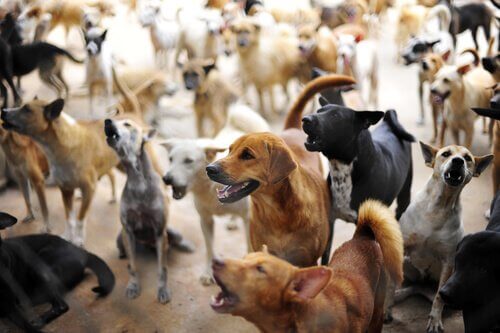Do Time Changes Affect Dogs?

In many different countries of the world, the hour changes in the Spring and Autumn. These time changes can affect us, changing our sleep patterns and either making it harder to wake up or to get off to sleep. What about dogs though? Do time changes affect dogs too?
As in most things, we can’t generalize. There are some dogs that are a little more sensitive and others that are less so. Although, normally, puppies and older dogs will feel time changes more, we’ll also show you how time zone changes and jet lag can affect any dog.
How could time changes affect your dog?

Animals are sensitive to any kind of change that breaks up routine habits. This is because, even though they don’t have a wristwatch or a phone to check the time, they have a biological clock in the same way that we do. However, theirs is much more sensitive than ours.
Therefore, whatever affects you can also affect your pet. For example, when the hour changes, your sleep and meal routine varies as a result. And, for that reason, the times of your dog’s walks, meals, and sleep will also be altered.
A dog that is affected by time changes could become nervous, or be a little irritable or disorientated. Having said that, it would be normal for your dog to adapt in a few days. It will shortly return to its normal life.
If this doesn’t happen, it would be a good idea to take your dog to the vet. The symptoms might have appeared due to the time change but might actually be caused by something else.
What dogs are more sensitive?
As we said above, puppies and older dogs are generally more sensitive to time changes. Sick dogs are also very sensitive, since they find it a little harder to adapt to changes.
When the time changes in Spring, giving us more hours of daylight, this causes the animal to receive more daylight than it’s accustomed to. This can bring about a series of changes that your dog will notice. The same thing happens in the Autumn when nighttime is brought forward an hour.
Jet lag and changes in the time zone can also affect your dog
When you go on long trips that involve changing continents with resulting significant time zone changes, your dog can also suffer. In addition to this, traveling on a plane can provoke fatigue, digestion problems, bad moods, and sleep changes in your dog.
The best thing to get your pet used to the time zone change would be to do it gradually. Each day, you can bring your dog a few minutes closer to the time you want him to adjust to.
For example, you could feed him a few minutes earlier or later each day, until he’s eating his meals at the correct new time. In this way, he can gradually adapt to the time change.
Other changes that can affect your dog

Just because they are animals, it doesn’t mean that they don’t get affected by what happens around them. Any kind of change that happens to their life, routine and rhythm can make them feel nervous, anxious and even cause physical effects such as vomiting or other things.
One example of these changes, apart from changes in the time of day, could be when you move house. A dog gets to know its environment quickly, but will take a few days to do so.
Therefore, when you move house, it’s normal that your animal might miss the other place. It might take a few days to adjust to the new one. Meanwhile, it may appear depressed and even lose its appetite. Make sure you give it lots of attention and care throughout this time.
Another change is a change of family, and this can be a drastic change in the life of a dog. The animal could take quite a while to become accustomed. If the new family doesn’t treat the dog similarly to the previous family, it could start to show signs of depression.
For any kind of change your dog has to go through, you will need to adapt it to the change gradually. In this way, the changes will be easier and more bearable for your dog, and a lot easier for you too!